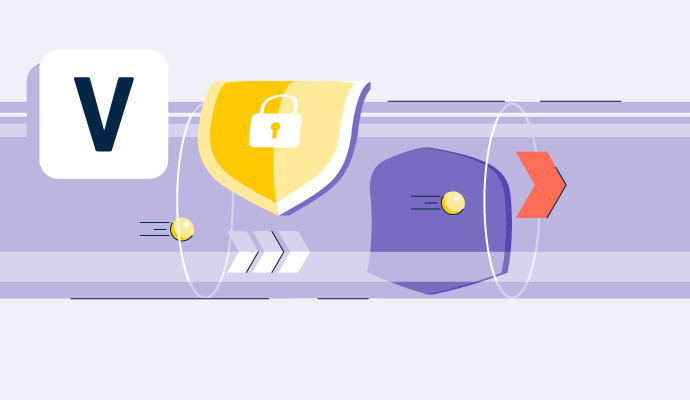What is a virtual private network?
A virtual private network (VPN) is a service that provides an encrypted connection from a device to a network over the internet. VPNs disguise a user’s online identity, making it more challenging for third parties to track online activities and steal data. While widely used in corporate networks, they’re also useful for protecting personal information in public Wi-Fi settings.
Virtual private networks are largely used by corporations and allow for data transmission. Companies use virtual private network software to provide employees with secure, encrypted, and remote access to the company’s internal network.
This software allows employees to access applications, files, printers, and other corporate resources on the corporate network as if they were physically at the office. Applying strong encryption to all incoming and outgoing traffic ensures that no third parties can access confidential information.
Types of virtual private networks
There are many different types of virtual private networks. However, the two main types are:
- Remote access VPN is computer-to-network. It allows users to connect to the company network from anywhere, making remote work safer and more accessible. This type of VPN is ideal for personal use; however, it may be unsuitable for larger corporations.
- Site-to-site VPN is commonly used by businesses, specifically large corporations with multiple branches. Using site-to-site VPNs to connect corporate offices to branch offices is the most effective way to ensure secure communication within and between large departments. Multiple users in various locations can access each other’s resources.
How does a virtual private network work?
A VPN hides user IP addresses by redirecting them through a specifically configured remote server run by a VPN host. Since traffic is encrypted between the device and network, the internet service provider (ISP) and other third parties can’t see what data a user sends and receives – it remains private.
VPNs allow employees to work outside the physical office and securely connect to the corporate network with laptops, smartphones, and tablets.
Benefits of a virtual private network
Using VPNs helps users protect themselves from hackers and cyber criminals as data is protected and can’t be deciphered. Other benefits of a virtual private network include:
- Using public Wi-Fi safely: While convenient, using public Wi-Fi at locations like airports or coffee shops comes with the risk that someone may be tracking online activity. VPNs help protect personal data and hide browsing history from potential hackers.
- Data privacy from ISPs: Although users are safer using their home Wi-Fi versus a public connection, their information is not fully protected. ISPs like Comcast and Spectrum can access users’ internet data and browsing habits. However, VPNs help obscure user IP addresses from their ISPs.
- Protect personal data from online apps: Many online apps have been exposed for gathering and selling user data. Therefore, using a VPN prevents apps from pairing a user’s behavior to an IP address and can also limit the tracking of browser history and location.
- Secure encryption: VPNs allow for maximum security on public and private networks. Information is encrypted and nearly impossible to decipher.
- Disguises user location: Since demographic location data comes from another country, third parties can’t determine a user’s actual location. Also, most VPNs don’t store data of user activities, leaving user behavior completely hidden.
- Secure data transfer: Users working remotely usually need to access and share confidential files on the company’s network. To access the network, companies often require VPNs to ensure the connection is secure and prevent data from leaking.

Amanda Hahn-Peters
Amanda Hahn-Peters is a freelance copywriter for G2. Born and raised in Florida, she graduated from Florida State University with a concentration in Mass Media Studies. When she’s not writing, you’ll find Amanda coaching triathletes, cuddling up with a good book, or at the theater catching the latest musical.

